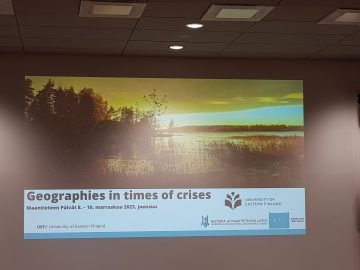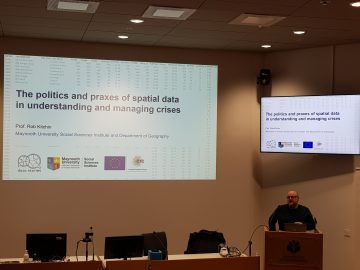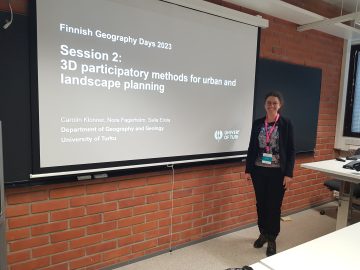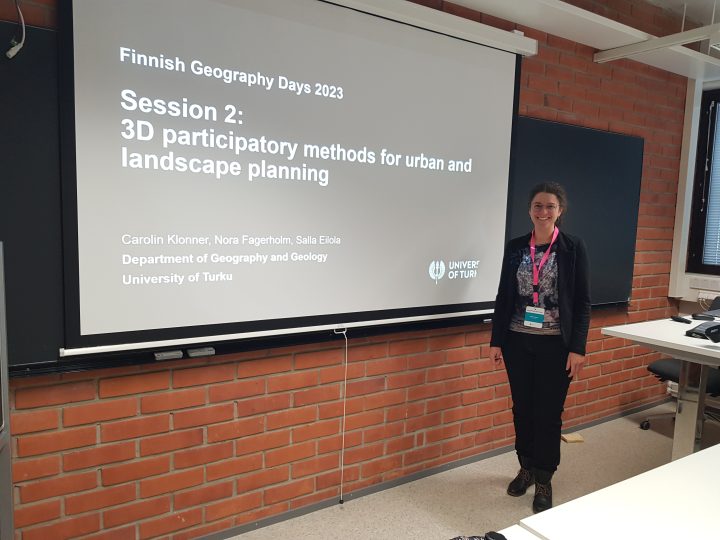Tackling crises as a sustainability researcher?
Carolin Klonner & Salla Eilola, Department of Geography and Geology, University of Turku
Several Sustainable Landscape Research group members participated in the annual Geography Days conference this time in Joensuu, 8th to 10th November 2023 (Figure 1). The conference was themed Geographies in times of crises and the concept of crises was covered in various aspects: energy crisis, urban and rural sustainability crisis, crises of social inequality. The topics of our research group touch more or less on these aspects.

Figure 1. Geography Days in Joensuu, 8.-10. November 2023.
We had an interesting and insightful time with different keynotes, sessions and panel discussions. In his keynote, for example, Prof. Rob Kitchin (Figure 2) urged the geography community to more consciously reflect on their role as researchers in the crises. He introduced a categorization of researchers’ positionality in society. One is the detached apolitical independent knowledge producer position that rests on the idea that researchers are objective and scientific knowledge is neutral. The knowledge can be used by other social actors to evaluate and formulate their own decisions. In the other position researchers are actively trying to change the world and are themselves inseparable from their own subjective values and experiences even while conducting research. This position sees research always political and situated. In this position, the researcher has the choice to conduct critical and independent research holding the state and industry accountable to the society; engage with society as a researcher activist through opposing the status quo or partner with the state and industry as a critical friend sometimes needing to make compromises while seeking change within.
We would argue that within our research group we are all trying to achieve change in the world but each of us has consciously or unconsciously chosen a different way to do this: as activist researcher, critical friend or separate outside critic. The position may also vary depending on the issue at hand. However, it is interesting to notice that within our research team we have not actually discussed the researcher’s positionality before. Perhaps even some back-to-basics epistemological discussion on the nature of knowledge could be fun while our research team has been growing in recent times and become more versatile.

Figure 2. Keynote by Prof. Kitchin.
On the first day of the conference, our team organized a session called 3D participatory methods for urban and landscape planning (Figure 3) including a presentation about our previous work in Turku (https://sites.utu.fi/greenplace/online-3d-based-participatory-mapping-for-urban-planning-pilot-case-shows-usability-challenges-exist-especially-with-smart-phones/). With two presentations and ample time for discussion, we had a great opportunity to talk about how to engage citizens into urban planning via open access easy-to-use tools to collect 3D data, for example. Our second presenter introduced a structure-from-motion method that has been developed to capture heritage sites in a 3D data form. For the presented use case, an open web platform was used which creates point clouds based on many individual pictures taken by a drone camera or simply a smartphone. We brainstormed some applications for it to be used in participatory urban planning. The combination of researchers from various backgrounds and countries together with urban planners in the audience allowed us to discuss practical concerns as well as new collaborations for tackling the need to engage more with citizens.
In addition to new networks and ideas, we also got to experience a glimpse of white, snowy November in Joensuu. A pleasant surprise and a comforting scene in these times when climate unpredictability is a constant.

Figure 3. Our session about 3D participatory methods for urban and landscape planning.
